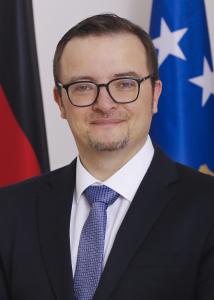The publication consists of a theoretical analysis and public opinion research, aiming to shed additional light on this recent political period.
The public opinion research was conducted in August 2021.
The size of the sample includes 1110 respondents, while maintaining the general ratio in terms of basic demographic characteristics (gender, age over 18, ethnic belonging, professional and educational background), in alignment with the appropriate geographic balance.
In conducting the research, a quantitative research methodology of data collection was applied (via a telephone survey), which enables a reliable and accurate scan of the views of the general population.
The marginal error ranges between +/- 2.9% with a 95% confidence interval.
The survey was conducted by the Institute for Political Research (IPIS).
The questions can be divided into six groups:
1. Questions related to the ways in which the process of gaining the independence of today’s North Macedonia was carried out through secession from the SFRY;
2. Questions related to the key challenges facing the country in the past 30 years, such as NATO membership, the EU integration process, privatization, and the three agreements: the Prespa Agreement with Greece, the Friendship and Cooperation Agreement with the Republic of Bulgaria, and the Ohrid Framework Agreement;
3. Questions related to the role and legacy of the key politicians since the period of gaining independence until today;
4. Questions about the relations of the state with other relevant states and organizations;
5. Questions related to the situation in some key areas over the past three decades, such as the economy, education, health and emigration;
6. Questions of a summary nature regarding the expectations for the development of the country in the next 30 years.
Based on the research results, the following more typical conclusions can be drawn:
1. According to the respondents’ answers, the most popular politicians in the past three decades are: Boris Trajkovski (42% of the respondents rated him with the highest grade - 5), Kiro Gligorov (33% of the respondents rated him with the highest grade – 5)) and Nikola Kljusev (21.1% of the respondents rated him with the highest grade - 5).
2. 43.1% of the respondents think that the country has had a successful development for the past three decades, which is a difference of 6.9% compared to those who have the opposite view.
3. According to the respondents’ answers, the most positive aspects of the past three decades are: the acquisition of the state’s independence (15%); the process of integration and the integration in the EU and NATO (6.3%), and the progress and modernization of the country (2%), while the most negative are: crime and corruption (12.7%); economy and living standards (7.1%), and political instability (3.1%). In this segment, it is important to highlight that a high 70% cannot tell or do not know which event is the most positive in the past 30 years, as well as 56.8% of respondents who cannot tell or do not know which event is the most negative in the past three decades.
4. 46.3% of the respondents support the Ohrid Framework Agreement. Although the support of this agreement is more pronounced among the members of the Albanian ethnic community, it can still be concluded that 20 years after its signing, the awareness of the majority of citizens regarding its effects and benefits is quite high.
5. 38.5% of the respondents support the Friendship and Cooperation Agreement with Bulgaria. This low threshold of acceptability can be brought in direct correlation with the general dissatisfaction of the citizens with Bulgaria’s attitude, which has culminated after the veto imposed by our eastern neighbour in relation to the start of the country’s negotiations for EU membership.
6. 41.5% of the respondents support the Prespa Agreement which resolved the ‘Macedonia’ name dispute. The analysis of the results points to the conclusion that despite the initially expressed pessimism in the period immediately after the conclusion of the Agreement, three years later there is a continuous positive change in the citizens’ mood.
7. 59.8% of the respondents support the membership of North Macedonia in NATO. The reasons for this significant level of acceptance should be sought in the short-term benefits, as well as in the long-term expectations for the effects on the stability of the country provided by the membership in this international organization.
8. 38% of the respondents positively assess the EU integration process. The low rating is a result of the long-standing stagnation of European integration, mostly as a result of the country’s bilateral challenges in the relations, first with Greece, and then with Bulgaria.
9. In relation to the Western Allies, it is important to emphasize the respondents’ perception of the Federal Republic of Germany (69.5% have a good, very good or excellent opinion) and of the United States (57.4% have a good, very good or excellent opinion). This result is based on the decades-long continuous support of both countries in relation to the accomplishment of North Macedonia’s state priorities, especially in terms of the EU and Euro-Atlantic integration processes, as well as in terms of the overall internal development of the country.
10. Respondents also give positive marks for China (60.2% have a good, very good, or excellent opinion), Russia (61.5% have a good, very good, or excellent opinion) and Turkey (79.5% have a good, very good, or excellent opinion). The reasons for such perceptions are divergent. Namely, in the case of Turkey and Russia, an important element is the cultural proximity experienced by different segments of the population in relation to these countries. However, a more important reason that is a common denominator for the three countries together is their decades-long diplomatic activity aimed primarily at using the country’s problems in relation to the EU and NATO integration processes, in order to create a public impression of a high level of support.
11. For 35.6% of the respondents, in the next three decades the state will have a better development, for 22.6% the state will have a worse development, while for 16.6% of the respondents the state will have a similar development as before. This implies that the number of respondents who have a positive view of the development of the country in the next 30 years is 13% higher, which points to the conclusion that there is a high level of optimism among respondents regarding the future of North Macedonia, and the reasons for that should be sought in the stronger state-building capacity of the citizens, as well as in their attachment to the accomplished independence of the state.







